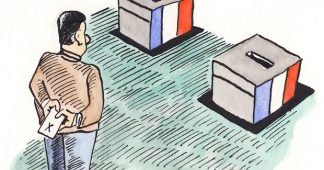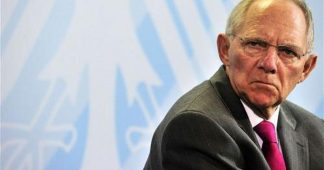By Peter Schwarz
The German enthusiasm for Emmanuel Macron has not lasted long. On the evening of the election, all parties, with the exception of the far-right Alternative for Germany (AfD), cheered the victory of the candidate regarded as the most pro-German and pro-EU of those standing in the French presidential election. But even before Macron has taken office and formed his government, fierce disputes about how to deal with the new president have erupted.
Macron’s plans to liberalize the French labour market, to cut billions in government spending and reduce taxes are generally welcomed. However, his demand to obtain more financial leeway from the European Union for the realization of this offensive against the working class is meeting strong opposition in German government and business circles.
The Frankfurter Rundschau describes the fundamental conflict as follows: “Macron wants to reform and spend more money. Merkel and Schäuble want to reform and save money.”
In the Bild tabloid, Finance Secretary Jens Spahn (Christian Democratic Union, CDU) rejected Macron’s ideas, arguing that “neither the eurozone nor France suffer from too little debt.” Manfred Weber (Christian Social Union, CSU), the head of the conservative group in the European parliament, told the Rheinische Post, “Macron can only demand reforms in Europe when he has proved that his own country is capable of reform.”
In Bild, Christian Lindner, head of the Free Democratic Party (FDP), stressed, “France will not solve its problems though credit, but with economic reforms. We have hopes for Macron, but he cannot make more debts than allowed.”
Eric Schweitzer, president of the German Chambers of Commerce and Industry (DIHK), expressed similar views. “I do not think much about the socialisation of debts,” he told the Rheinische Post. “This would weaken Germany and Europe, because investors and savers could lose confidence in the euro.”
The weekly Die Zeit posed the question in large letters: “Should we pay for France?” Numerous newspapers also dealt with the subject in commentaries and editorials.
Macron’s proposals to establish a joint finance and economic ministry and its own budget for the eurozone are particularly controversial. So-called eurobonds are anathema to Chancellor Angela Merkel and her finance minister Wolfgang Schäuble. They would reduce interest rates for heavily indebted countries and increase them for Germany. Government spokesman Steffen Seibert already made clear the day after Macron’s electoral victory that nothing had changed regarding the clear “no” of the German government regarding such bonds.
There are, however, German proponents of Macron’s proposals, especially in the ranks of the Social Democratic Party (SPD) and the Greens. They fear that Macron’s anti-worker reforms could trigger revolutionary rebellions or boost the right-wing National Front, and therefore want to allow him more financial leeway.
When the German government of Gerhard Schröder (SPD) and Joschka Fischer (Greens) introduced the Agenda 2010 welfare and labour reforms between 2003 to 2005, which Macron regards as a model, they were able to keep resistance under control by temporarily ignoring the supposedly strict EU budget criteria. Macron, on the other hand, already provoked fierce protests in 2016 when he introduced a reform of the labour market as the economics minister of President François Hollande.
In a press release, Vice-Chancellor Sigmar Gabriel (SPD), who as German minister of economic affairs worked closely with Macron in 2016, is now calling for “fiscal policy orthodoxy” to be abandoned and “to work together with the French on a Franco-German investment fund.” “The foreign minister is convinced,” writes Spiegel Online, “if Berlin does not now make concessions to the 39-year-old in the Élysée Palace, Marine Le Pen could yet become president in five years.”
Similarly, a commentary in Die Zeit argues, “If this president believes fiscal policy concessions from Germany will help him to sell the necessary reforms to his own electorate, then, from a German perspective, political wisdom dictates to accept such a deal.”
Should Macron not demonstrate rapid progress, according to Die Zeit, Marine Le Pen “would reach again for the presidency in five years, at the latest. And with whom would we join forces if France left the EU and the European post-war order is in ruins? With the Turks? The Russians? Donald Trump?” Macron’s failure would be “significantly more expensive for Germany than any Eurobond.”
The dispute over how to deal with Macron is primarily about questions of foreign policy. While most of the CDU, CSU and FDP are set on maintaining a strict austerity course, even if this creates difficulties for the new French president, the SPD and the Greens consider the Franco-German axis to be so important for the preservation of the European Union that they are prepared to make financial concessions. All parties agree, however, that Macron’s attacks on the rights and achievements of French workers must be fully supported.
The fact that conflicts over these questions are erupting only days after Macron’s election shows the depth of social and national tensions in Europe. The notion that the continent could be united on a capitalist basis emerges more and more as an illusion.
Germany and France have drifted wide apart economically, especially since the 2008 financial crisis. While Germany has recorded budget surpluses and reports new foreign trade records almost every month—for the month of March exports rose to €118.2 billion and the export surplus to €25.3 billion—France is experiencing high deficits. In France, the official unemployment rate is almost double Germany’s and youth unemployment three times higher than in Germany.
The conflicting economic interests of the leading imperialist countries inevitably lead to ferocious political tensions, no matter who forms the government. They are the main reason for the growth of nationalism, authoritarian forms of rule, and militarism.











